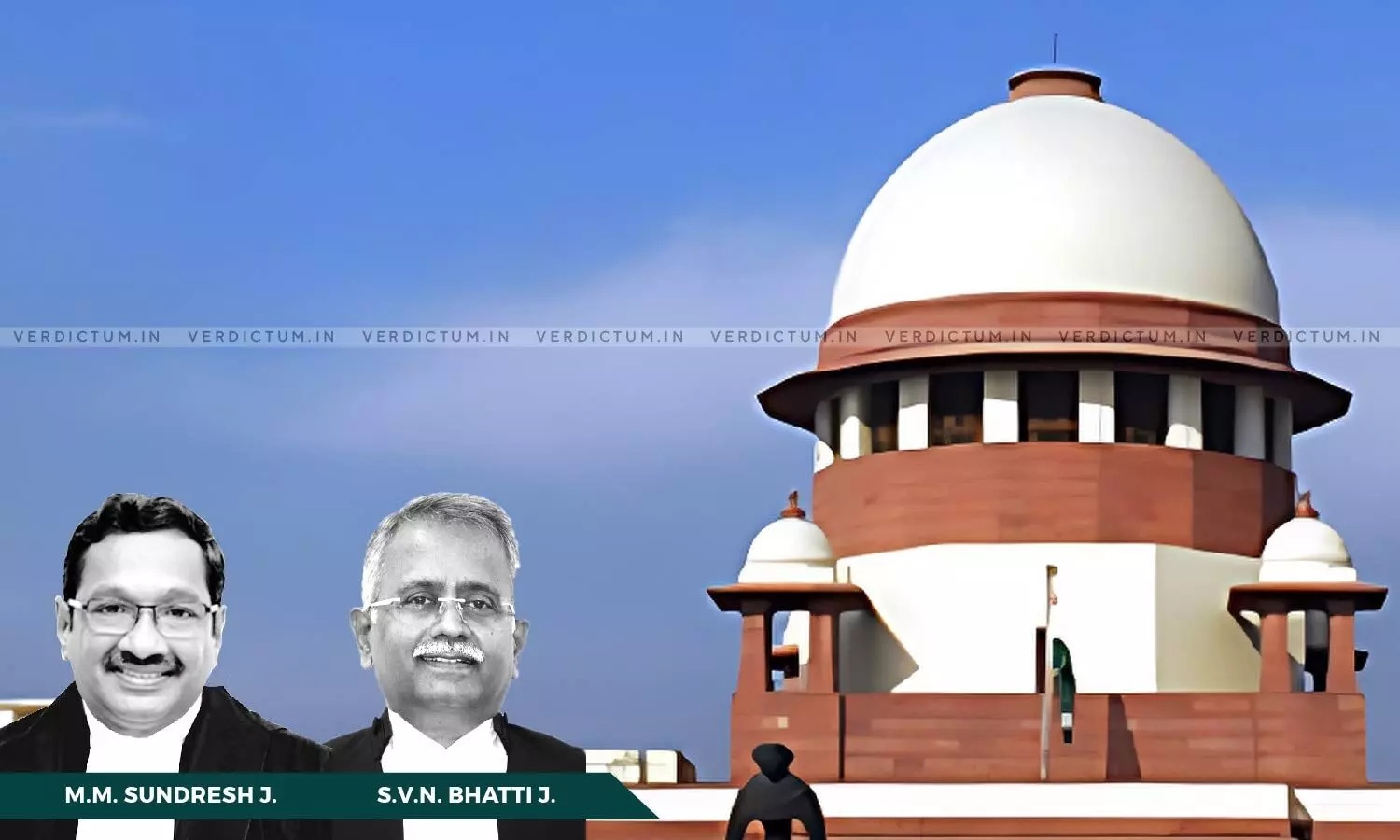
CrPC 1973 Shall Be Pressed Into Service From 31 October 2019 In J & K; It Has No Retrospective Application: SC
 |
|The Supreme Court observed that the Code of Criminal Procedure, 1973 shall be pressed into service from 31.10.2019 onwards in Jammu & Kashmir, and thus has no retrospective application.
The Court observed thus in an appeal preferred by the National Investigating Agency (NIA), New Delhi against the judgment of the Jammu and Kashmir High Court by which the judgment of the Special Judge, NIA was confirmed in part while remitting the issue pertaining to the charges framed under Sections 306 and 411 of RPC along with Section 39 of Unlawful Activities (Prevention) Act, 1967 (UAPA) for taking cognizance afresh.
The two-Judge Bench of Justice M.M. Sundresh and Justice S.V.N. Bhatti held, “CrPC, 1973 would govern the field only from the appointed day and consequently the CrPC, 1989 stands repealed. To reiterate, it would come into effect only from the appointed day, and therefore has got no retrospective application. To make this position clear, the CrPC, 1973 shall be pressed into service from 31.10.2019 onwards, and thus certainly not before the appointed day."
Additional Solicitor General S.V. Raju represented the appellant while Advocate D. Mahesh Babu represented the respondents.
Factual Background -
A case was registered against the respondents (accused) under Sections 307, 120-B, 121, 121-A, and 124-A of RPC and Sections 4 and 5 of the Explosive Substances Act, 1908, and Sections 15, 16, 18 and 20 of the UAPA by the jurisdictional police. The case was re-registered by the appellant (NIA) subsequent to the order of the Ministry of Home Affairs (MHA), Government of India. A complaint was conveyed by the District Magistrate via communication to the NIA Court in tune with Sections 196 and 196-A of the Criminal Procedure Code (CrPC) and thereafter, an investigation was duly completed. Accordingly, the respondents were charge-sheeted for the offences under RPC, UAPA, Explosive Substances Act, and Jammu & Kashmir Public Property (Prevention of Damage) Act, 1985 for making an attempt to ambush and ram the convoy of Central Reserve Police Force (CRPF) personnel.
Before their attempt could succeed, a blast occurred resulting in the respondents fleeing from the spot. While taking cognizance, the Special Judge, NIA held that the complaint conveyed by DM was not in the prescribed form and therefore, did not satisfy the mandate as contemplated under Section 4(1)(e) of CrPC, 1989. The Judge concluded that no cognizance can be taken for the offences under RPC as the procedure under CrPC was not followed. Resultantly, cognizance was taken for the remaining offences and being aggrieved by such decision, both the appellant and respondents filed their respective appeals. The High Court held that the Special Judge was wrong on two counts with respect to Sections 4(1)(e) and 196-B of CrPC. It upheld the finding of Judge on the question of authorization under Section 196-A of CrPC. Hence, the appellant was before the Apex Court.
The Supreme Court in the above regard noted, “We place reliance on the following provisions of the Jammu & Kashmir Reorganisation Act, 2019 (hereinafter referred to as “the Act, 2019”) … The Act, 2019 came into effect from 31.10.2019, which was the appointed day as per Notification No. S.O. 2889(E) dated 09.08.2019. Section 95 of the Act, 2019 speaks of the application of the Central Laws to the Union Territory of the Jammu & Kashmir and Union Territory of Ladakh. The aforesaid notification provides a date of application i.e., 31.10.2019, for the implementation of the Fifth Schedule of the Act, 2019.”
The Court said that CrPC, 1973 would govern the field only from the appointed day and consequently the CrPC, 1989 stands repealed. It reiterated that the same would come into effect only from the appointed day, and therefore has got no retrospective application.
Furthermore, the Court noted that there is nothing to infer either from the Act, 2019 or the Order, 2019 that CrPC, 1973 will have a retrospective application, however, the Order, 2019 did take into consideration all the difficulties that might arise by facilitating the continuance thereunder. It held that while an investigation could continue after its initiation under the CrPC, 1989, by way of the application of the CrPC, 1973, it cannot be stated that even for a case where there was a clear non-compliance of the former, it can be ignored by the application of the latter.
“Para 2(13) confers sufficient power on the investigating agency to deal with such a situation. While we are holding that the requirement of an authorization or an empowerment is mandatory for conveying a complaint, it being at the conclusion of investigation, would not preclude the investigating agency from complying with it thereafter. It is an approval from an appropriate authority of the investigation having been completed. … If we were to hold that even by way of a prospective application, notwithstanding the non-compliance under the CrPC, 1989, the appellant shall be permitted to prosecute the respondents, we would only be applying CrPC, 1973 retrospectively, which as discussed is not permissible”, it concluded.
Accordingly, the Apex Court partly allowed the appeal and set aside the judgment of the High Court to a certain extent.
Cause Title- National Investigating Agency New Delhi v. Owais Amin @ Cherry & Ors. (Neutral Citation: 2024 INSC 447)
Appearance:
Appellant: ASG Surya Prakash V Raju, Advocates Swati Ghirdiyal, Udai Khanna, Sairica S Raju, Raghav Sharma, Ashutosh Ghade, and AOR Arvind Kumar Sharma.
Respondents: AOR D. Mahesh Babu, Advocates Muzaffar Iqbal Khan, Shishir Pinaki, Dhanaeswar Gudapalli, Manoj Kumar, Mallika Das, Amber Jain, and Devjee Mishra.